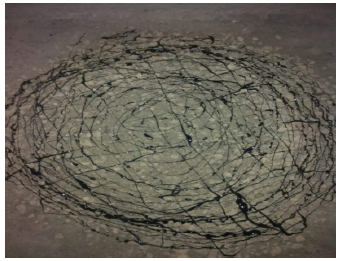Study of Use of Bitumen Fiber to Increase Flexural Strength of Concrete by Pandey I* in Advancements in Civil Engineering & Technology_ Open Journal of Civil Engineering

Abstract
There
is sudden increase in blast phenomenon either due to terrorist attack or due to
accidents. As a result, security and safety of structure becomes more important
and considering blast load in design aspect of structure. One of the ways to
increase the concrete strength is to increases the size of the member which
will increase the stiffness of the structure and the uplift force below the
foundation, but this not only increase the economy but also the factor of
limited area will be restrain. This objective of this study is to find the mechanical strength of concrete
which can withstand impact and blast loads. In this paper use of use of
high-performance concrete is used along with bitumen fiber to give large
deformation. Main focus was to increase the ductility of concrete and strong
enough to resist blast impact loads without failure. Use of such concrete will
considerably affect the economy of the structure by reducing the dimension of
the members.
Introduction
Since
the time of World War, I there was increase in demand of development of blast
resistance structure. It is during World War II the defense organizations took
keen interest and funded the researchers carried on RCC structures subjected to
blast loading [1]. The application of blast loading on structures affects the
walls, columns, beams and slabs by impact waves. Therefore, a structural
designer must ensure the failure of structure in ductile manner. The building
constructed in Oklahoma City using non ductile concrete design proved to be
extremely dangerous [2]. In high rise buildings due to decrease in wavelength
the impact loading the time period increases. So, to reduce the effect of blast
loading the size of the beam column is increased. Another approach to tackle
the blast load is to add shear wall and bracings but as result the cost of the
construction increases. Another way to reduce the effect is to use columns at
closer distance at or near the ground. The columns are also sometimes wrapped
with carbon fiber reinforced sheets, but it then affects the economy of the
construction. Many researchers have shown in their research that the cost of
construction of blast resistance of new structures is far overpriced than the
cost required for retrofitting of a present structure to same standards [1].
The main damage mechanics of an explosion is supersonic shock waves that
transmit radially from the blast origin like a bubble. The blast which occur at
or near the earth’s surface, ground waves also take place and are handled
similar to seismic waves [1]. The use high performance concrete (above M60) has
added advantages over conventional concrete due to high compressive strength,
low porosity, improved microstructural homogeneity, high flexibility with
addition of fibers [3]. The design of high-grade concrete was made achievable
by reduction of micro-cracks in the hydrated cement paste and the transition
zone which results in reduction of porosity and reducing in homogeneity in the normal
concrete
https://crimsonpublishers.com/acet/fulltext/ACET.000571.php
Crimson
Publishers: https://crimsonpublishers.com/
For
more articles in Open Journal of Civil
Engineering,
Please
click on below link: https://crimsonpublishers.com/acet/



No comments:
Post a Comment